#Economic Diversity
Explore tagged Tumblr posts
Text
Buckinghamshire VS West Sussex
Buckinghamshire and West Sussex are both counties in England, and they have distinct characteristics. Here's a brief comparison of the two:
Location:
Buckinghamshire: Located in South East England, Buckinghamshire is close to London and is known for its picturesque countryside, historic towns, and proximity to the Chiltern Hills.
West Sussex: Situated in the South East of England as well, West Sussex is known for its diverse landscapes, including the South Downs National Park, beautiful coastline, and historic towns.
Countryside and Landscapes:
Buckinghamshire: Known for its rolling hills, the Chiltern Hills Area of Outstanding Natural Beauty, and the Thames Valley, Buckinghamshire offers a mix of rural and suburban landscapes.
West Sussex: Offers a diverse landscape with the South Downs, which is a range of chalk hills, as well as coastal areas along the English Channel.
Economy:
Buckinghamshire: The county has a strong economy, with a mix of industries including technology, healthcare, and finance. It is home to some affluent towns and has good transport links to London.
West Sussex: The economy in West Sussex is varied, with a focus on agriculture, manufacturing, and tourism. It also has commuter towns and is within reach of London.
Towns and Cities:
Buckinghamshire: Includes towns such as High Wycombe, Aylesbury, Olney and Milton Keynes. Milton Keynes is a new town known for its modern planning and development.
West Sussex: Chichester, Worthing Littlehampton, and Crawley are among the towns in West Sussex. Crawley is known for its proximity to Gatwick Airport.
Historical and Cultural Attractions:
Buckinghamshire: Boasts historical sites like Bletchley Park, the former World War II codebreaking centre, as well as historic houses like Waddesdon Manor.
West Sussex: Features attractions such as Chichester Cathedral, Arundel Castle, and the Weald and Downland Living Museum.
Transportation:
Buckinghamshire: Well-connected to London by road and rail, with the M40 motorway passing through and several train services.
West Sussex: Accessible by major roads, and Gatwick Airport, one of the busiest airports in the UK, is located in West Sussex.
Ultimately, the choice between Buckinghamshire and West Sussex depends on personal preferences, lifestyle, and specific needs. Both counties offer a mix of rural charm, historical attractions, and economic opportunities.
#Buckinghamshire#West Sussex#South East England#County Comparison#Chiltern Hills#South Downs National Park#Rural Living#Historical Attractions#Economic Diversity#Towns and Cities#Transportation#Countryside Landscapes#Chichester#High Wycombe#Aylesbury#Worthing#Crawley#Bletchley Park#Arundel Castle#Local Economy#today on tumblr#new blog
7 notes
·
View notes
Text
A Symphony of Sounds in the Afforestation Area

View On WordPress
#acoustic environment#afforestation#American Red squirrel#auditory experience#auditory exploration#auditory information#bird calls#bird identification#black-capped chickadee#Canadian National Railway#community life#community quality#conservation awareness#Cornell Lab#crickets#ducks#Ecological Impact#ecological listening#ecological sound#economic diversity#economic impact#environmental balance#environmental impact#environmental sounds#forest ambience#forest ecosystem#forest experience#forest harmony#forest life#forest sounds
0 notes
Text
Poverty Displayed in Fiction
TL;DR: I wish authors would stop using poverty as a temporary character skin when readers are told it’s a defining characteristic/obstacle.
Stealing stuff sucks, getting your stuff stolen sucks, getting caught sucks, and in most worlds being poor and starving means you die, not that you just steal shit from all the rich people around you — there aren’t rich people around you.
Poverty is not a plot arc. It’s not a noble thing for a character to get through, it’s a trauma we have to recover from. It’s exhausting and you engage in the world around you in a different way, your expectations for your life or survival are held in a different place, in your gut not your heart. Depression, anxiety, financial instability, the threat of homelessness, malnutrition/obesity, increased stress, lack of sleep, developing mental disorders or disorders devoid of treatment, PTSD from events more likely to happen in poverty-ridden neighborhoods like criminal violence, gang wars, assault, sa, abuse left unchecked etc. It sets different moral standards.
I keep running into these adult fantasy books that I’ve been calling gritty-girl books, where the female authors write a badass character and she’s poor, and so she’s gritty and desperate and clinging to the opportunity or potential of whatever the catalyst is, or compromising the characters own morals (like I know stealing is wrong but I’m going to starve, instead of I don’t think stealing this is wrong), but I don’t know if it’s the author or the editors, if the books are smoothed out to be understood by a certain middle-class audience because they’re the ones with money, but there’s an irritating trend where the poverty is treated like an accessory to an otherwise healthy character, so they are denied the bigger problems of ignorance or naivete that actually come with poverty.
Cinderella works because she is not poor. She grew up wealthy, going to these festival functions, learning to dance, she knows the social rules of the upper class, it is her immediate family who mistreat her. An actual rags-to-riches girl going to the ball wouldn’t know how to dance, might not recognize the prince, or would be happy just being there at all, maybe with a group of friends who broke in together because the consequences don’t matter when you’ll be dead by twenty.
Okay, there’s the opening of my TedTalk, I have a lot more thoughts but I’m stopping myself because I don’t think specific books need to be named. I’m just... I’m sick of the romanticization of poverty for the drama. The traumas might be interesting but they take so much longer to unravel because there isn’t time for regret. There is no safe place to run home to when things don’t work out, there’s just people calling you crazy and trying your best not to believe it, or spiraling because maybe it’s true.
But the biggest indiscretion to me is the lack of ignorance. Being poor (from the beginning, not a stumble down and get-back-up) and trying to not-be-poor is so full of humiliation and embarrassment. Here are some (ugh, personal) examples for the dark-academia aesthetic that is usually the most irritating offender:
Your college professors fail you because you don’t talk right, you didn’t learn academic English but they expect you to know it.
You give a presentation in your best dress and the sponsor asks to talk to you about dress codes and someone calls you slutty or ghetto and you realize your best dress isn’t that great and the fancy hoops you got from your mom for your birthday are making them stare.
You are always overworked and underpaid; four jobs, all of them overlapping, and only some people understand.
The busses don’t run on time and you’re either running or waiting.
You wash your clothes in the bathtub and spend more money on bank fees because it costs to have an account if there’s not more than $1500 in it, and you’ve never even seen that much money at once in your life; you get a cash payout for a side gig and the $500 in twenties feels like you’ve made it somewhere, but when you tell your roommate, they laugh and call you so cute and the bank still charges you $5/month because it’s not enough. It will never be enough. You finally got $1500 scraped up to stop that slow leak and you get a letter/email kindly explaining that the usage fee now requires $2000 to remain in the account and a great way to do this is to move $500 to savings.
There’s an eviction warning notice taped to your door, but you paid rent. Your roommate didn’t. You scrape another half together and they swear to pay you back. They do, slowly, never enough to stop the bank fees. The property management changes and the new people are more strict, they say it’s okay to pay on the third because of your schedule when you show them your pay dates, but there’s another eviction threat on your door when you come home at midnight on the second. You sigh but none of your neighbors judge you because they understand. You wake up in four hours to go to your next job because they lied about not scheduling you as an opener, it’s all they will give you, and you need to pay rent two days earlier now. Your roommate is looking for another job but no one is hiring; the other roommate you were going to live with is getting married, she’s pregnant and didn’t want to be in school in the first place, you’re happy for her, but there is nowhere to live.
Your car breaks, held together by duct tape and prayers, your mechanic uncles did the best they could. You buy a new-used vehicle to get you to work and back, it’s a fixer-upper, your mechanic family checks it out and confirms it’s good. You bring it in for an oil change on your only day off and your uncle’s friend says sorry, but you can’t drive this off the lot, it’s unsafe and we can’t let you leave, the frame is rusted and the brakeline’s about to snap. It’s totaled out. The buses don’t run until 7 which is two hours after your open shifts start, so you start looking for a new job. You’ll graduate soon and there will be more jobs, better jobs. You have honors and all your professors say you’re going to do great things, and you are only moving forward in the hope that they are right, but what if they’re wrong?
Your phone is so old it’s just for emergencies, you don’t know how to communicate through social media, you never get the emails that class was canceled or changed, you can’t afford the contracts for a new phone and you’re using a laptop loaned from the school; you have to run to the library to print projects and papers, you don’t have time to find all the cool programs or connections of your peers who are learning extra skills and networking in their free time. You’ve never even been to anything akin to a frat party.
You started dating, but it was too stressful, so you went on dates instead of committing to a relationship, and that was a different kind of stressful, so you vow to stay single until you can breathe, but who knows when that will be and now you’ve got all these relationship traumas to work out later when you can start to sort the pieces, right now they don’t matter, they can’t, it’s 1am and you’re just getting home from closing because the manager was being ridiculous, you have an exam at 8am, another shift at the cafe at 10am, a paper due at 2pm, you’ll write that at work, and you’re supposed to be editing this dissertation by the end of the week, and your professor wants to know if you’ve thought about grad school. You’ve never thought about grad school.
You are always given a lecture by your councilor about how lucky you are to have this scholarship, while they also explain why the other scholarship fund was terminated and will no longer be covering room and board and yes it’s the middle of the semester, and yes the football team just got an anonymous $6million dollar donation for a new stadium even though we built that one six years ago, but we can’t do anything about it. You work your way through the FAFSA loan paperwork and sit through a workshop for first-generation students, the governor cuts another scholarship that you worked your ass off to get, again mid-semester and without warning, the money’s not there, they all explain. You see the loan money and it doesn’t even cover textbooks or food, just your final classes, and you wonder if it’s worth it. You check to make sure your loans aren’t inheritable by family, just in case you don’t make it, not because you’re depressed, but because there is a long list of health problems you’ve never gotten checked out because doctors are expensive and you’ve never had insurance.
You don’t have money or time, so you don’t eat; you sprain your ankle but you don’t go get it checked out, you just add it to the list of future-problems you’re not sure you’ll get enough time to address, but you’ve been living on the edge of life-and-death for your whole life, so it doesn’t feel dramatic, just a shuffle of priorities. Your peers whine and complain and you try to understand them, and it’s not until a new friend/partner comes in and starts pointing out the damages, genuinely concerned, that you notice how much they’re even hurting you, how much you can’t sleep even when you find the time, how you go until you’re curled up napping in a hallway, passed out as classmates try not to wake you — you used to think it was a superpower that you could sleep anywhere but really it’s sad and now your recognize their looks were pity, not empathy.
You don’t have time to go to club meetings with the peers from your major so they don’t know who you are, and you don’t even know you’re supposed to do that because no one helped you through this. You start hanging out with grad students because they understand more, they’re more willing to forgive, and they’re as exhausted as you. You’re doing the master’s program anyway, so they like you, but they can’t help you.
Obviously not everyone’s experience is the same and money-problems-right-now doesn’t directly mean poverty, but it’s just so common in these adult fantasy books with one foot in the dark-academia aesthetic, and it just triggered me.
How do these characters already know how to dress like their peers? Where did they get jewel-toned and neutral clothes when the thrift stores mostly have the neons that were so popular ten years ago and their cousin/sibling hand-me-downs stopped fitting over the summer? How did they get the required tools, textbooks, and language skills? How are their bodies healthy? How are they confident and focused on their goals, when they don’t even know how to sign up for classes and still have to work fifty hours a week plus credits? When the magical opportunity to take a break or solve a problem is presented, why are they hesitating? How come their priorities don’t match their situation or character or past that we spent the whole book reviewing?
Obviously this is being pedantic.
There are many different types and layers of poverty and abuse and neglect and struggle, I think it’s just that all these characters share the same kind: they lost their parents so there’s no one to teach/hurt them anymore, they don’t have money but they don’t have debt, they fell in with the wrong crowd but have no addictions or strings pulling them back, there was nothing good about those people, they grew up in violence and uncertainty but have big dreams for their certain futures. They’re always a kind of exception-character, and my frustrations are of my own making because I get momentarily excited at the representation or the relatability, only to have the rug pulled out like: just kidding, they’re not that kind of poor, they’re conveniently poor, it’s fixable (but not with the magic, that’s for character development only).
The authors so often make these characters healthy people cosplaying in poverty, and then they have to explain the character’s choices because they don’t make sense (i.e. a character is stealing even though they think its wrong, but no one around them thinks it’s wrong so why do they feel guilty, ope, we’re lost in the exposition). And again, maybe this is because publishers/editors think the people with money to buy books won’t understand or relate or appreciate that kind of grueling obstacle, so they make the poverty a temporary problem, and by doing so, remove its impact on the character’s identity and choices. I don’t know, I’m just sick of it.
It’s like those slow-pan shots of athletes doing those mud-runs, but if all their hard-won muscles faded when they hose off at the end. It deflates the narrative and accomplishment of all the work that got the character to the point the author tells us they’re at. It feels like certain author’s felt insecure about writing the grittiness but didn’t want to make a Hallmark movie temporary-poverty type problem, so they just paper machete until it holds shape, or maybe the editors come through and strip it away and no one cares. I really don’t know. If it’s a defining characteristic, make it definitive, make it part of the character arc, if it’s not, don’t make it a defining characteristic.
OH MY GOD IT’S CHECKOV’S [POVERTY] GUN! That’s what it is! Don’t tell me how gritty and grimy your character is, don’t focus on how layered the dirt is as a selling point or major character/plot development, if we’re not going to work on scrubbing it off. If the character gets hosed down at the end and all the dirt comes off at once, then it’s not layers, it’s just one slip in a mud puddle. I think some authors try complicating characters and adding depth that isn’t necessarily needed, and then when everything’s supposed to be okay at the end, or the layers of dirt cause no problems, no itching, no stiffness, no smell, absolutely no impact to the character, I’m just left like: what? You made me look at the mud, I’m relating to the mud because you pointed it out, I can’t ignore it now... so... do something with it. Pick at it, scrub it off, toss your character in the deep end, but don’t just layer them in convenient mud for the looks and then assume it just washed away during the heroes journey or whatever. It’s weird. It’s a weird thing to do. There are more problems than money and plenty of seemingly-wealthy people have money problems, stop using poverty as an anti-hero morally-grey shortcut by association and assumption.
I’m not going to name the triggering books, but I will say that I think Starling House by Alix E. Harrow did a pretty gosh-darn good job at representation and the poverty isn’t an accessory, but a genuine antagonist in some ways.
#poverty#representation#representation in fiction#diverse fiction#diverse books#economic diversity#dark academia#dark academia aesthetic#gritty books#adult fantasy books#fantasy genre#some thoughts#just kidding#that was a whole ass rant#sorry for being depressing#university life#ranting
0 notes
Text

500 Blue Biden counties generate 71% of GDP.
2500 Red MAGA counties generate 29% of GDP.
Democratic counties are wealthier because they are urbanised, better educated, economically complex, and more productive economically.
Essentially, the wealth generating parts of the economy are also less conservative because of education and diversity.
🎯
414 notes
·
View notes
Text
Just another example that all the diversity and inclusion capitalism engages in is merely pageantry and performance meant to fit in with baseline social norms, this is why capitalism is perfectly compatible with likes of the KKK and Nazis.
#culture#leftism#politics#the left#progressive#eat the rich#communism#tax the rich#corporate greed#us politics#mcdonalds#mcdonald's happy meal#fast food#DEI#diversity#equity#inclusivity#economics#equality#fraud#fascismo#authoritarianism#us imperialism#anticapitalist#anti capitalism#anti work#antifascist#billionaires should not exist#economic events#economy
23 notes
·
View notes
Text
This KC blizzard hittin’ hard, and it got me thinkin’ bout when Tesla’s froze solid in Chi-town. Crazy how since then, Elon just doubled down on his DEI stance—some things never change. But if you want an electric car, why not keep it Black and roll with @derekautomotive ‘s Avani?
Avani
@bigcamiam
#Avani#tesla cars#dei#diversity equity and inclusion#elon musk#discrimination#racism#black owned business#black owned businesses#black economics#black business#black excellence#black people#blacklivesmatter#black lives matter#cars#automobile#automotive#electric cars#tesla
19 notes
·
View notes
Text
He wishes she would haunt him again with her sweet curses. That she would invade his nightmares once more like she did that first night. She's already occupied his every waking thought, why not his unconscious ones too?
And so he lies staring at the dangling glass of the chandelier above his head, waiting for his eyes to grow heavy so he may see that pale sharp face. Mor's knocking at his locked apartment door is a distant distraction when the hope of her, the blessed darkness that signals her arrival is so near.
Night comes but then the damned light of dawn. His eyelashes flicker and the chandelier refracts rainbows across the back wall. No summoning spell can summon a ghost who does not want to be found. Rhysand has become quite familiar with regret since first meeting her. But the oily dread that coats his gut is a new and unwelcome addition.
Nesta Archeron has been dead for six months but this is the first day she is gone.
#Rhysta weekend baby#Rhysta#Rhysand is a love sick loser#Yet again#Nesta is v dead#Side note I hate being cognitively different in the workplace#A genuine fucking nightmare#To get talks on the importance of cognitive and economic diversity at a conference from a dude who is exactly the same as the other bozos#And then have to mingle with people who all talk the same with the same references and backgrounds#Meanwhile me 🧍 looking frantically for someone I won't have to do the whole acting song and dance for in order to have a basic conversation
15 notes
·
View notes
Text
there's this kind of youtuber i lowkey really hate who aren't overt bigots or anything but just do this thing where they seem to try stupidly hard to look for reasons to hate media that just so happens to have a lot of marginalised rep in it. especially if it has a thematic point that would involve acknowledging politics
#my favourite example of that (as in i actually find it funny not it annoys me)#is cinemasins complaining the train in snowpiercer and the guy who wants the protagonist's eyes in get out don't make sense#like. they don't have to be explained in the story the point is they're a commentary on socio economic injustices and racism#stories aren't logic puzzles they're parables and if you read them as being logic puzzles you're doing it wrong#and spoiling a lot of really profound media for yourself#having said that the youtubers i hate most are reactionary cunts like nerdrotic critical drinker or turkey tom#they should be punched every time they upload until they fuck off#and the most annoying kind of youtubers (not hatable but annoying) are the ones who try to argue that mainstream media#which is trying to be diverse and progressive is Bad Actually (verilybitchie is awful for that and she doesn't like pan people#so that put me off her pretty quickly which is a shame bc some of her videos and topics are interesting)
34 notes
·
View notes
Text
on a quest to develop increasingly elaborate outfits that cause my partner to get an anime nosebleed when they see them.
#i think i might have lyrebird syndrome#i mean it works!#i have to make up for responding to questions with fifteen minute diversions on the economics of manufacturing industries#(lying)
17 notes
·
View notes
Text
fighting for my life for dark-skinned heathcliff in this wuthering heights class
#‘sometimes modern critical thinkers project modern ideas about race onto old novels’ GIRL IT’S IN THE TEXT !! TAKE IT UP WITH THE WOMAN#HERSELF EMILY BRONTE !!!!#like u can debate his ethnicity Sure but god he is non-white how many times does bronte have to write ‘dark-skinned’ in aspect for that to#be clear#‘the characters call him ‘dark’ in reference to his brooding angry byronic personality’ PORQUE NO LOS DOS !!!!!!!! THEY GO HAND IN HAND AND#INFORM EACH OTHER !!!!#‘it’s britain in the late 18th century it’s not as diverse as modern day Britain’ GIRL THE SLAVE TRADE ?#LONDON THE ECONOMIC CAPITAL OF THE (WESTERN) WORLD ?#LIVERPOOL A HUB FOR THE SLAVE TRADE ?#jay rants#does heathcliff wishing he had ‘light hair and fair skin’ mean nothing to u
6 notes
·
View notes
Text
Fractured Narratives: The Collapse of Colonialism, Nationalism, Imperialism, and Capitalism in the Postmodern Era
Jean-François Lyotard, a prominent postmodern philosopher, provides a nuanced framework for understanding the interconnectivity and unsustainability of colonialism, nationalism, imperialism, and capitalism through his critique of metanarratives and his exploration of power dynamics in the postmodern condition. Interconnectivity Metanarratives and Power Structures: Lyotard’s critique of…
#Capitalism#Colonialism#critique#diversity#economics#environment#Imperialism#Instability#Jean-François Lyotard#knowledge#Lyotard#Matanarratives#Nationalism#Pluralism#political dynamics#Politics#Post-Colonialism#Postmodernism#power#Power Structures#Social Criticism#The Differend#uncommensurability#universalism
3 notes
·
View notes
Text
I think we Bronies should revitalise the "Love and Tolerate" slogan and expand it's meaning to encompass diversity, equity, inclusion, economic and social justice efforts.
#mlp#mlpfim#my little pony#politics#brony#bronies#brony fandom#love and tolerate#love and tolerance#love#self love#tolerance#tolerate#tolerate it#diversity#equity#inclusion#diversity equity and inclusion#economy#economics#social justice#economic justice#socialism#democracy#democratic socialism#progressivism#humanism#humanistic#centrism#liberal democracy
5 notes
·
View notes
Text
I haven't even mentioned it yet, happy month, homos and (never) home-owners
#get it? it's because of your economic crisis#and your influx of diversity acceptance!#which is slowly dwindling downhill#happy pride!
3 notes
·
View notes
Text
"A cornation reflecting multi-faith Britain"
Charles Defender of ALL Faiths

The unprecedented joint declaration from other religious leaders reads: "Your Majesty, as neighbours in faith, we acknowledge the value of public service. We unite with people of all faiths and beliefs in thanksgiving, and in service with you for the common good."
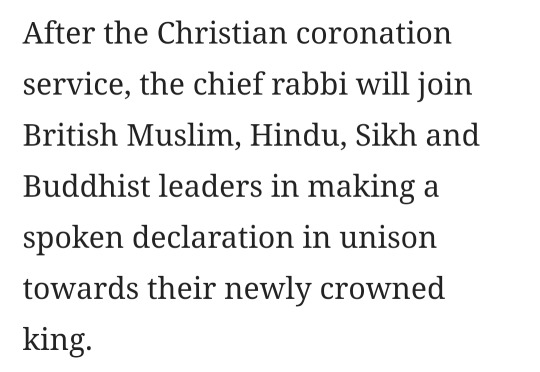


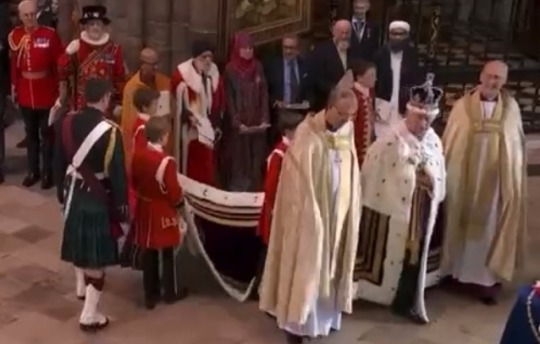
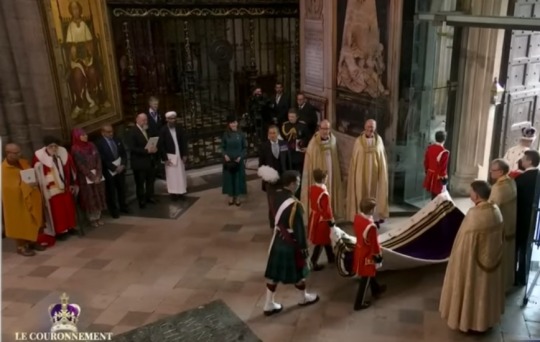
Something that would never occur in a mosque or temple:
After the Christian coronation service, the chief rabbi will join British Muslim, Hindu, Sikh and Buddhist leaders in making a spoken declaration in unison towards their newly crowned king.
"It will be quite brief, but exceptionally powerful," Mirvis said, while stressing that he was not required to speak into an electronic microphone in the abbey, again to respect the Jewish holy day.
@hunnymae @honeytothebee
@sandiedog3 @skippyv20 @lovelycariad
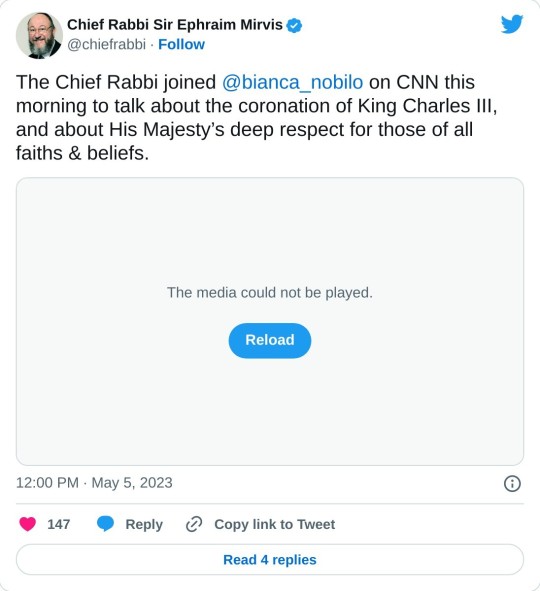
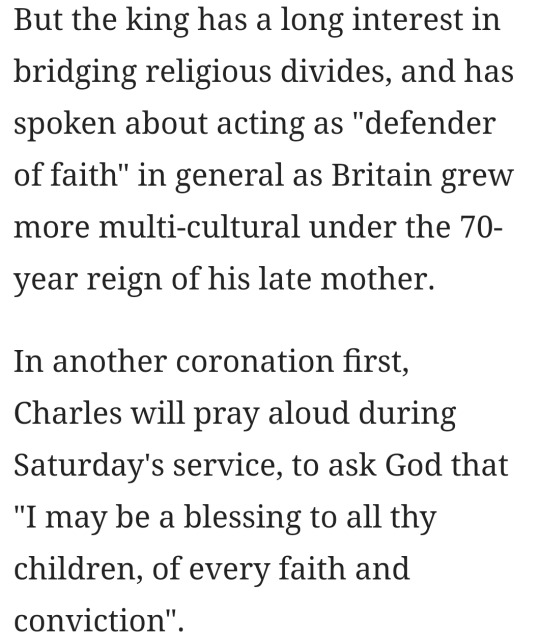
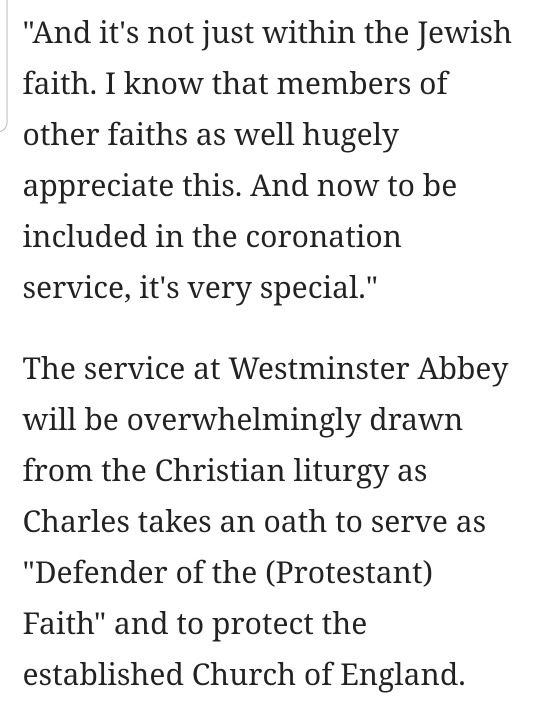
"And it's not just within the Jewish faith. I know that members of other faiths as well hugely appreciate this. And now to be included in the coronation service, it's very special."
The service at Westminster Abbey will be overwhelmingly drawn from the Christian liturgy as Charles takes an oath to serve as "Defender of the (Protestant) Faith" and to protect the established Church of England.

#pluralism#marxism#brf#pluralism and diversity#defender of all faiths#wef#world economic forum#klaus schwab
23 notes
·
View notes
Text
i started making the profiles for sohee’s smau and im so excited oh em gee!!! i’ll probs post this weekend 🫶🏼
(read the tags for a hint of what’s coming)
#:: soo rambles#we love a good college au with some forced proximity sprinkled in there😼#also still thinking on sohees major#someone said he planned on majoring in music but idk abt the credibility of the source#i just want a lil diversity in the majors lolz#shotaro apparently was majoring in economics or smth before dropping out?#but idk#THT MIGHT BE COMPLETE BS LOL i just saw it briefly somewhere#riize
5 notes
·
View notes
Text
The Ultimate Guide to Solo Board Games
In recent years, solo board gaming has quietly emerged from the shadows of its multiplayer counterparts, carving out a distinct and vibrant niche within the board game community. Once considered a pastime for the introverted or those struggling to find a gaming group, solo board gaming has transcended these stereotypes to become a celebrated and integral aspect of the hobby. Whether due to the…

View On WordPress
#adventure games#augmented reality gaming#automata opponents#board game apps#board game geek#board game reviews#board games#community gaming#crowdfunding games#digital board games#economic games#game adaptation#game apps#game balancing#game complexity#game customization#game design#game development#game diversity#game exploration#game learning#game mechanics#game narratives#game objectives#game playthroughs#game publishers#game recommendations#game replayability#game setup#game strategy
3 notes
·
View notes